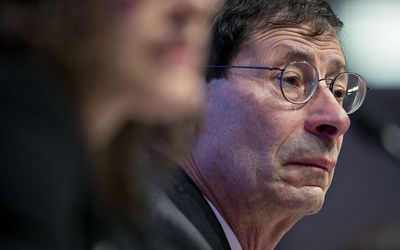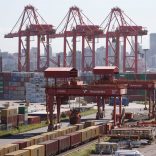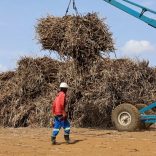South Africa plans measures to support exporters hit by Trump tariffs
Dim IMF outlook for SA and emerging markets

Bloomberg / International Monetary Fund chief economist Maurice Obstfield addresses a press briefing at the IMF headquarters in Washington, DC, the US, on Tuesday.
Emerging markets including SA, would face economic headwinds and their currencies could weaken further, the International Monetary Fund (IMF) warned on Tuesday, as it cut forecasts for global growth.
Prospects remained uneven and poorer compared to the past two decades, it said in its World Economic Outlook report.
The fund again lowered SA’s economic growth forecasts for this year to 0.6% from 0.7%, and to 1.2% from 1.8% for next year.
“Unfortunately, risks to this outlook are tilted to the downside, and if they materialise, could push growth lower than in the IMF’s current baseline,” IMF senior resident representative in SA, Axel Schimmelpfennig, said. “With fiscal and monetary policy on a tightening course, the IMF believes that policies to promote private sector-driven inclusive growth are more important than ever.”
The Treasury forecasts growth at 0.9%, and the Reserve Bank and the World Bank put it at 0.8%. But the most pessimistic is Nedbank Group Economics, which expects only 0.2% growth this year. With labour instability possible during wage negotiations in the mining and manufacturing sectors, “prolonged labour strikes would hurt output in those sectors and drag the economy into recession”, Nedbank economist Isaac Matshego said.
The IMF expects commodity prices to remain low for some time. Commodity exporters had to adjust to lower prices, and diversify their economies, Mr Schimmelpfennig said. SA may be on the cusp of a contraction, but is better off when compared with Brazil and Russia, which are mired in deep recessions.
China’s economic growth forecasts were revised upwards to 6.5% for this year, and 6.2% next year. This may support commodity prices, and bodes well for SA, which exports significantly to China. Emerging markets are expected to be hit by greater capital outflows. “Increased net capital outflows from emerging markets … could lead to further depreciation of their currencies.”
Growth in advanced economies was to remain modest, in line with last year, the IMF said.
“Growth has been too slow for too long,” IMF chief economist Maurice Obstfeld said. “There is no longer much room for error.”
The global economy is expected to grow 3.2% from an earlier forecast of 3.4%, and next year, it is projected at 3.5%, from 3.6%. “The recovery is projected to strengthen in 2017 and beyond, driven primarily by emerging market and developing economies, as conditions in stressed economies start gradually to normalise,” the IMF said.
The slow pace of the country’s growth was reinforced by data out on Tuesday, showing that consumer confidence remained in negative territory, implying muted household spending.
The First National Bank (FNB)/ Bureau for Economic Research’s consumer confidence index recovered some lost ground to -9 from -14 in the fourth quarter of last year. Low household spending will limit economic growth.
Although there was some uptick, at -9, the index is still worse than the -6 during the recession of 2009, indicating pessimistic consumers.
The slump in international commodity prices, political turmoil, low business confidence, a severe drought, soaring food prices and rising interest rates continued to weigh down domestic economic growth and job-creation prospects, FNB chief economist Sizwe Nxedlana said.













Leave a Reply
Be the First to Comment!
You must be logged in to post a comment.
You must be logged in to post a comment.